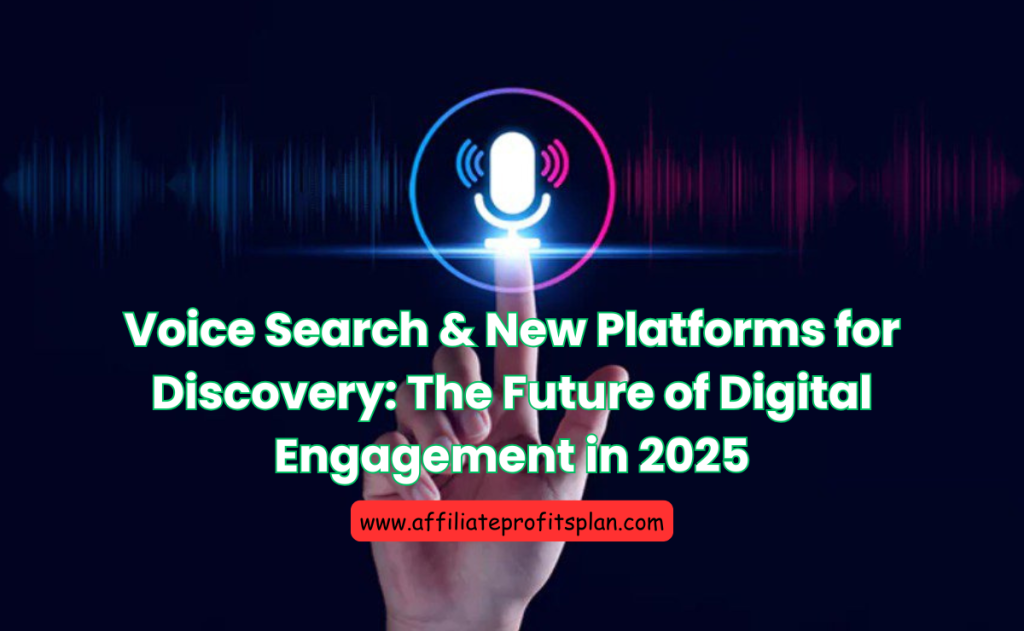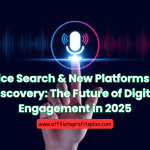Welcome to my article “Voice Search & New Platforms for Discovery in 2025”
In the ever-evolving world of digital marketing, voice search and discovery platforms have become more than just tech trends—they’re reshaping how audiences find information, products, and services online. With over half of all online searches projected to be voice-based by 2025, brands that fail to optimize for this shift risk being left behind. Voice assistants like Alexa, Siri, and Google Assistant are no longer secondary tools; they’re personal gatekeepers to the digital world.
According to insights from Google Voice Search Overview, user voice interactions have grown exponentially in 2025. As we move deeper into the age of AI-driven search, the platforms people use to discover content are expanding beyond traditional Google searches. From voice-enabled smart devices to TikTok, Pinterest, and even AI chatbots, the discovery landscape has diversified dramatically. Understanding these channels—and how to adapt your strategy—is essential for marketers, creators, and businesses aiming to maintain visibility.
This article explores how voice search optimization and emerging discovery platforms are transforming digital marketing in 2025. You’ll learn how to adapt your SEO, content, and brand strategies to capture attention in this new, voice-powered frontier.
Access Our Proven Tested Formula for $50-$100 Daily Income – Watch This FREE Video >>

1. The Evolution of Voice Search & Discovery Platforms
Voice search has transitioned from a futuristic feature to a mainstream behavior. What began with smartphone assistants has expanded into cars, smart TVs, and even household appliances. Today, people expect to find information effortlessly—hands-free, accurate, and conversational.
By 2025, voice queries have become deeply contextual, with AI understanding tone, location, and user intent more accurately than ever before. This evolution has massive implications for marketers. Traditional keyword-heavy SEO is being replaced by natural language processing (NLP)—which focuses on how people speak, not just what they type.
AI-driven platforms are not just changing marketing but also income generation, as explored in How AI is Revolutionizing Online Income Streams in 2025.
For example, instead of typing “best pizza NYC,” users might ask, “Where can I get the best thin-crust pizza near me right now?” The difference lies in intent and context. Businesses that adapt their content to these conversational patterns—through long-tail, voice-friendly keywords and structured data—are the ones appearing in voice results.
Moreover, optimizing for local voice search has become crucial. Nearly 58% of consumers use voice to find nearby services, making “near me” queries a goldmine for local businesses. Brands that integrate schema markup, fast-loading sites, and localized content are thriving in this ecosystem.
2. How AI Assistants Power the Future of Digital Discovery
In 2025, AI assistants are no longer just tools—they are decision-makers that curate user experiences. Alexa, Google Assistant, and Siri now shape how consumers discover brands, products, and even news stories. Experts at HubSpot highlight how voice search is transforming content strategies for marketers.
This means marketers are optimizing for AI visibility, not just search engine visibility. To appear in voice search results, your brand’s digital ecosystem must provide concise, structured, and trustworthy data. AI assistants pull from credible sources like Google’s featured snippets, FAQ sections, and knowledge panels.
Another layer of complexity comes from AI-driven personalization. Voice assistants now learn from user behavior, preferences, and purchase history. This creates micro-moments of opportunity—when your content must perfectly align with what the AI thinks a user wants.
Businesses succeeding here are integrating AI SEO tools, updating content formats, and embracing semantic optimization—writing content that answers real human questions naturally.
3. Voice Search Optimization: Writing for Natural Conversations
Voice search thrives on conversation. People speak differently than they type, and Google’s algorithms now reflect that reality. In 2025, ranking well means writing the way people talk—simple, direct, and engaging. Recent data from Statista shows that over 50% of all online searches are now voice-based.
Voice search and mobile optimization go hand in hand—see why in Mobile Marketing: Why It’s Crucial for Your Internet Marketing Strategy
To succeed, your content must answer who, what, when, where, and how questions quickly. Using featured snippet-friendly formats—short paragraphs, bullet points, and clear headings—helps your content become the top voice answer.
Additionally, FAQ pages, how-to guides, and microcontent have become powerful tools for voice optimization. By anticipating user intent and providing concise answers, you increase your chances of being the spoken result delivered by AI assistants.
Tone also matters. Conversational, empathetic content resonates better with audiences (and algorithms). It’s no longer enough to write for search engines—you must write for people using search engines through AI intermediaries.
4. Emerging Discovery Platforms Beyond Traditional Search Engines
While Google remains dominant, new discovery platforms are redefining visibility in 2025. TikTok, Pinterest, YouTube Shorts, and Instagram Reels have evolved into search-first ecosystems, where users actively seek products, tutorials, and reviews.
Access Our Proven Tested Formula for $50-$100 Daily Income – Watch This FREE Video >>
These platforms reward creativity and engagement over traditional SEO metrics. For example, TikTok’s algorithm surfaces content based on watch time and user behavior, not backlinks. Pinterest prioritizes keyword-rich visual storytelling, while YouTube’s AI recommends videos aligned with user intent.
For affiliate marketers and content creators, this means building multichannel discovery strategies. Repurpose voice-friendly content into short-form videos, pins, or AI summaries. Integrate trending sounds, subtitles, and relevant hashtags to tap into organic reach.
Voice search and visual discovery now coexist, giving rise to hybrid SEO strategies that combine text, visuals, and voice—all optimized for user intent.
5. Local & Hyper-Personalized Voice Search Strategies
Voice search has revolutionized local marketing. Whether it’s “best coffee near me” or “24-hour gym in Boston,” AI delivers instant, personalized answers based on GPS data and previous habits.
Businesses that optimize for Google My Business, include accurate NAP (Name, Address, Phone) details, and earn positive reviews dominate this space. Voice assistants prefer reliable, data-rich sources that enhance user trust.
In 2025, hyper-personalization is the next frontier. AI-driven systems use user preferences, previous searches, and even tone analysis to deliver tailored recommendations. Marketers leveraging AI chatbots, predictive analytics, and CRM data can engage users with unprecedented precision.
The result? A seamless, conversational experience that feels personal—and converts effectively.
6. AI in E-Commerce: Automating Voice Search for Conversions
Voice search is revolutionizing how consumers shop and buy online. From “Alexa, order me protein powder” to “Hey Google, what’s the best running shoe under $100?”, AI-powered discovery has entered the sales funnel.
Affiliate marketers must now focus on voice-commerce optimization—crafting product descriptions, blog posts, and comparison articles that align with natural language. Adding structured data (like product schema) helps assistants identify your content as relevant for voice-based product searches.
Additionally, integrating AI chatbots into e-commerce sites allows seamless conversational shopping experiences. These tools not only assist customers but also gather insights that improve targeting and conversion rates.
Voice commerce isn’t just the future—it’s already here. Businesses optimizing early are capturing high-intent, low-competition voice traffic others overlook.
7. Preparing for the Next Wave of AI Discovery Platforms
The future goes beyond voice—it’s multimodal. Users are now blending voice, visuals, and gestures to search across devices. Think: asking your phone to identify a product from a photo while getting voice-assisted buying options.
Platforms like Google Lens, TikTok Search, and ChatGPT-powered discovery engines are redefining how people find information. The most successful brands will integrate all three dimensions—voice, visual, and contextual SEO—into a unified strategy.
To prepare, marketers must focus on:
- Creating AI-readable content (structured data, clean metadata).
- Adopting visual SEO for image-based discovery.
- Building cross-platform content ecosystems that thrive across text, video, and audio.
This holistic approach ensures your brand remains visible—no matter how users search.
Conclusion: The Power of Voice Search & New Platforms for Discovery
As we enter a new era of AI-powered discovery, voice search represents a deeper shift in human behavior. It’s not just about convenience—it’s about connection. Users no longer want to search; they want to converse and discover effortlessly.
Marketers who embrace this transformation—optimizing for conversation, personalization, and authenticity—will own the digital future. The key is balancing technology with humanity. Because at the end of every “Hey Alexa” or “Hey Google” is a human being seeking genuine value.
Access Our Proven Tested Formula for $50-$100 Daily Income – Watch This FREE Video >>
Voice search and new discovery platforms are not just opportunities—they are the new foundation of visibility and engagement in 2025 and beyond.
Thanks so much for reading my article on “Voice Search & New Platforms for Discovery in 2025”. I hope you found it helpful. See you next time with more insights!
FAQs: Voice Search & New Platforms for Discovery
Q1. How is voice search changing SEO in 2025?
Voice search focuses on conversational queries, long-tail keywords, and context-based answers—requiring marketers to optimize content for natural language and intent.
Q2. What are the best tools for voice search optimization?
Use tools like AnswerThePublic, Google’s NLP API, and Semrush Voice Search reports to identify and optimize voice-friendly phrases.
Q3. Which discovery platforms are trending in 2025?
TikTok Search, Pinterest Lens, YouTube Shorts, and ChatGPT-powered search engines are rapidly growing as alternative discovery hubs.
Q4. How can small businesses benefit from voice search?
By optimizing for local voice queries, maintaining accurate business listings, and encouraging reviews, small businesses can dominate local discovery results.
Q5. What’s next after voice search?
The future is multimodal search—a fusion of voice, visual, and text-based discovery enhanced by AI personalization and predictive algorithms.










